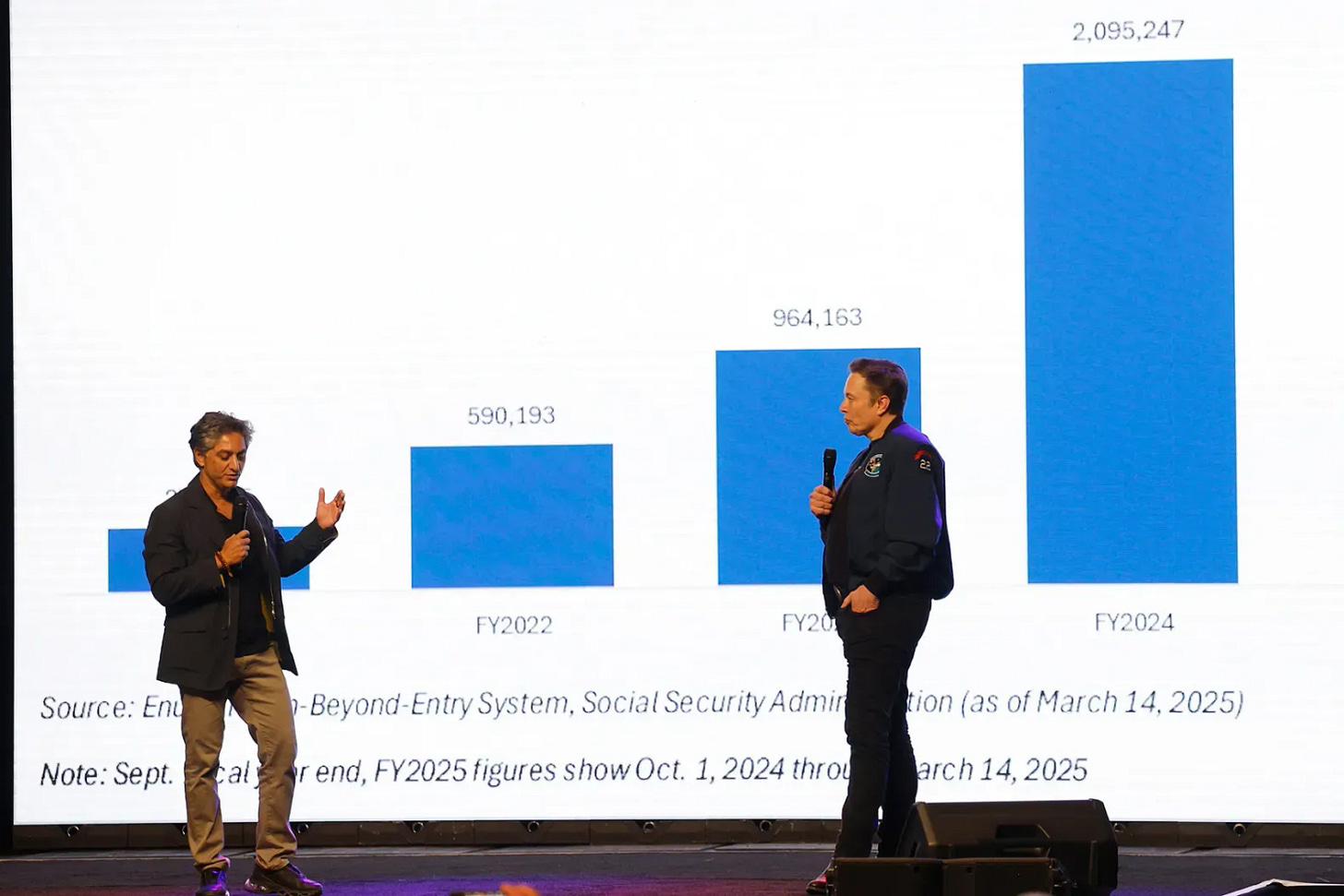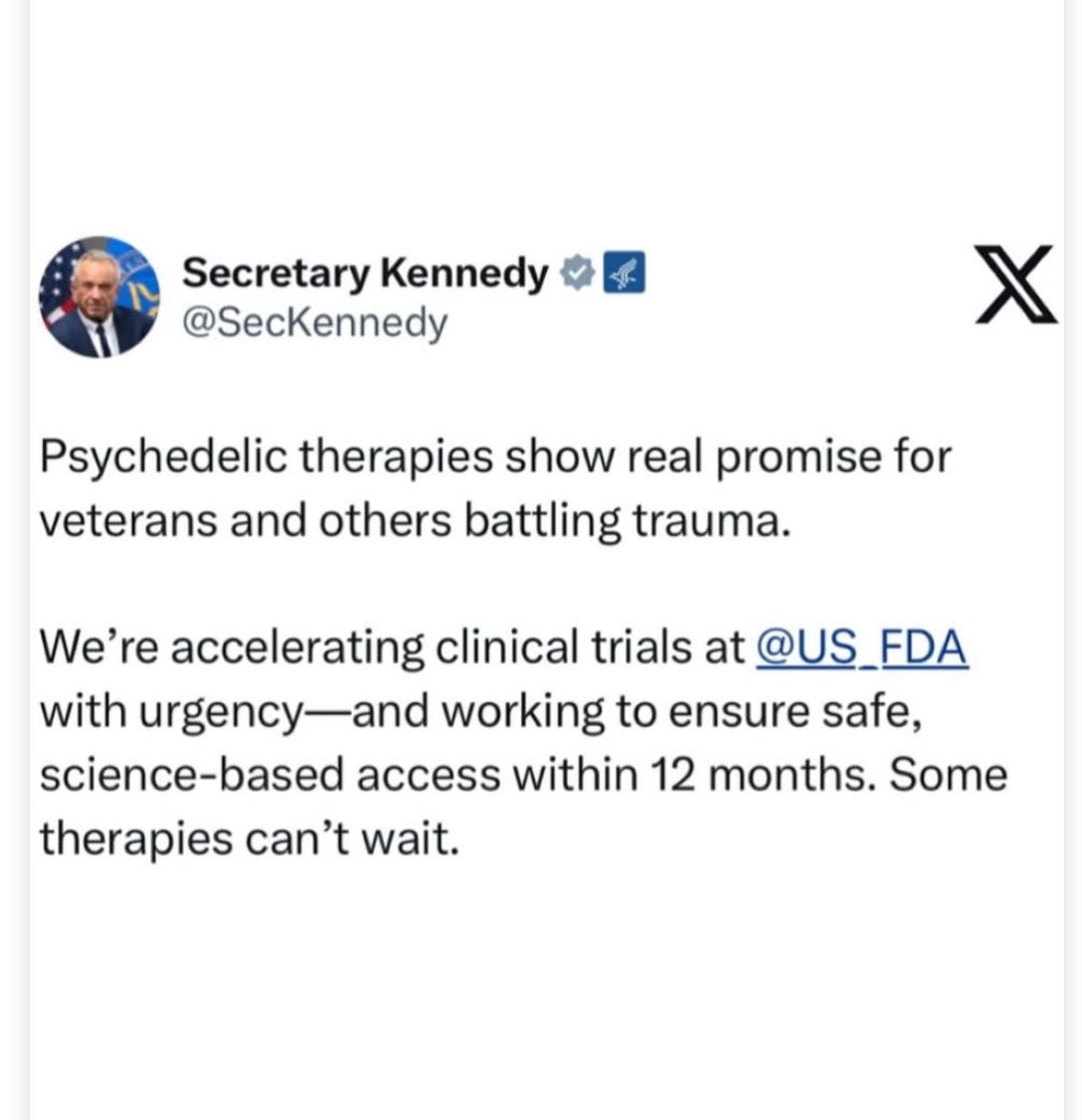RFK pushes the accelerator on psychedelic medicines
Good news for Lykos
If RFK wants psychedelic medicine for trauma to come to market in 12 months, that’s good news for Lykos
Earlier this week, Secretary of Health and Human Services Robert F. Kennedy went to Congress and the Senate to defend his proposed 25% cut in HHS spending, the drastic reduction in NIH research funding and the job cuts at FDA, CDC and other parts of HHS. He was accused of lying in his confirmation hearing when he assured senators he would not change HHS vaccine policies - he has since fired the HHS vaccine advisory board and replaced it with various vaccine sceptics, cut US funding for the Global Alliance of Vaccines and Immunization, and published numerous statements warning of the risks of vaccines from his new ‘HHS Secretary’ social media accounts. This is one of Secretary Kennedy’s tweets from this week - a 1300-word essay on the risks of the flu vaccine. His critics say his use of public office to undermine support for vaccines will cause deaths.
But never mind all that. What caught the attention of the struggling psychedelic industry were his comments on psychedelics. Representative Crenshaw asked him during the hearing ‘what steps will you take to accelerate the safe deployment of these medicines for trauma-related disorders?’ Rep. Crenshaw, by the by, was a prominent figure in the PR campaign to persuade the FDA to approve Lykos’ MDMA-assisted therapy for PTSD last summer.
Secretary Kennedy replied:
We are launching clinical trials now on that at FDA, I think there are 11 clinical trials at the VA going on at this point, particularly for our service members, retired service members. It’s critically important that we make sure the science on this is solid. The preliminary results are very very encouraging. And it’s something that we want to pursue. Martin Makary [RFK’s head of the FDA] has said that we don’t want to wait two years to get this done, these are people who badly need some kind of therapy. This line of therapeutics has tremendous advantage if given in a clinical setting. We are working very hard to make sure that happens within twelve months.
He tweeted this remark after the hearing, just to make sure we got the message.
This was a very interesting remark but what exactly does it mean? I asked an HHS spokesperson for clarification. They told me:
As Secretary Kennedy stated, “psychedelic therapies show real promise for veterans and others battling trauma." This is a strategic prioritization to deliver access to innovative, evidence-based treatments for those suffering from trauma, especially our veterans. They deserve more than just hope, they deserve action, and that’s what we are delivering.
I think RFK is referring to two possible things. First, HHS’ support for work at Veteran Affairs and the Pentagon to expand access for veterans and serving soldiers to psychedelic medicine especially through VA and DOD funded clinical trials and (if the legislation gets passed) new ‘centres for excellence’. The VA has been trying for many years to reduce the number of veterans suffering from PTSD and taking their own lives - 17 US veterans die from suicide each day. Secretary Kennedy said he is in regular contact with VA Secretary Doug Collins on the issue of expanding access to psychedelic medicines for veterans - and indeed Secretary Collins went to visit Rachel Yehuda’s psychedelic research centre in New York last week.
The second thing I think he may be referring to is Lykos’ bid to get MDMA-assisted therapy for PTSD approved by the FDA. Lykos is the corporate spin-off of MAPS, the psychedelic non-profit founded in 1986 by Rick Doblin to get MDMA therapy FDA-approved. Doblin has been trying for 40 years to get MDMA therapy approved as medicine, and raised something like $180 million in charitable donations to achieve that. In 2024, MAPS launched Lykos, a corporate spin-off, which raised $100 million in shareholder investment.
Lykos submitted its New Drug Application to the FDA last year, but was rejected - to the dismay of psychedelic industry and culture - after a brutal advisory committee hearing voted near-unanimously that it wasn’t safe or effective (despite impressive results - the issue was the committee didn’t trust the results). That was a heavy blow for Lykos - CEO Amy Emerson resigned and 75% of the work-force was laid off - and for the fledgling psychedelic industry. Various pro-psychedelic public figures expressed their dismay at Lykos’ failure to get approval, including RFK, who blamed the FDA for its ‘aggressive suppression’ of psychedelics.
Usually, if a drug company’s NDA gets rejected by the FDA, it has to go away and do another Phase 3 trial, which costs $50-100 million and can take 18 months or more. Lykos was preparing to do that, and looked set to jettison MAPS’ beloved psychotherapeutic model in favour of a more stripped-down traditional pharma approach. But now, remarkably, you have the US Secretary of Health saying he wants to make psychedelic medicine for trauma available within 12 months. The only way that could happen, as far as I can figure out, is if Lykos resubmits its existing data and gets approved by the FDA, without having to do a whole new Phase 3 trial. Lykos is keeping schtum, and who knows what dialogue it’s having behind closed doors with the FDA.
By the by, at the end of May, Lykos very quietly revealed two new shareholders - the philanthropic foundations of Antonio Gracias, friend and business partner of Elon Musk and a colleague of his at DOGE, and British investor Chris Hohn. This was announced at 5pm on a Friday, in a press release so low-key it hasn’t even been reported. Gracias and Hohn took a $50 million stake in Lykos and could invest more. Gracias reportedly met Rick Doblin at Burning Man last year, and was persuaded to ride in like a white knight and save Doblin’s dream of MDMA-assisted therapy in a not-for-profit model (although Lykos will still be a for-profit corporation).

Josh Hardman of Psychedelic Alpha suggested last month that Lykos’ new shareholders are hoping Lykos won’t have to do another Phase 3 trial but can rather negotiate with a new and friendlier HHS and FDA, resubmit its existing Phase 3 data, and then collect more safety data through a REMS-type procedure after being approved and coming to market. I asked Josh on LinkedIn, ‘what do RFK’s comments this week practically mean? my guess is it means Lykos doesn’t have to do another phase 3 trial.’ Josh replied: ‘This is practically a given at this point, yes.’
RFK has appointed so many pro-psychedelic figures at HHS it’s startling to resemble Zendo Project. Last month, Casey Means was appointed as the new Surgeon-General - she has been public about her own use of shrooms. Also last month, Matt Zorn, a pro-psychedelic lawyer, was appointed RFK’s new deputy counsel (and possibly the new ‘psychedelic czar’). Two weeks ago, RFK’s new deputy secretary, Jim O’Neill, was sworn in - he is a fan of psychedelic medicine, a regular at Burning Man, and ex-employee of Peter Thiel, an investor in psychedelic start-up atai. For the icing on the cake, the FDA just appointed a new senior drug evaluator from…Usona, a psychedelic drug non-profit preparing its own NDA for psilocybin, while another figure has left the FDA and joined Lykos. As one industry figure put it: ‘The HHS deck is well and truly stacked with pro-psychedelic figures. It’s almost too stacked, like, don’t show your hand so much.’
Meanwhile, Martin Makary, the new head of the FDA, introduced a new National Priority Voucher system this month to accelerate the FDA’s drug approval process from a year to 1-2 months if a drug is ‘addressing a health crisis in the US’, ‘meeting unmet public health needs’ or ‘delivering more innovative cures’ - all of which psychedelic drugs could be said to be doing, especially with the crisis in veteran suicides. One psychedelic company, NRX, which is seeking FDA-approval for ketamine infusion therapy, has already applied for NPV accelerated approval.
Now RFK says he wants psychedelic medicine for trauma available in 12 months - which as mentioned sounds like great news for Lykos. I have been trying to figure out how unusual it is for the Secretary of HHS to actively support a private drug company’s new product before it’s been found ‘safe and effective’? I asked ChatGPT. It replied (to summarise):
It’s unusual but not unprecedented. The norm is regulatory neutrality and evidence-based endorsement. However, exceptions happen when there’s a declared public health emergency, when the government is financially invested, or for non-scientific factors such as lobbying. The risks of pre-market promotion are that it undermines public trust and raises ethical and legal issues about impartiality, and it may pressure regulators. Relevant examples: MDMA-assisted therapy. If HHS or NIH were to promote it before FDA approval, it would be notable and possibly controversial—even amid growing psychedelic enthusiasm.
The Anti-Vaxxers versus the Biohackers
Speaking to psychedelic industry figures, there is a lot of optimism about RFK’s and VA Secretary Doug Collins’ loud support for psychedelic medicine and for Lykos’ MDMA-assisted therapy. At the same time, it’s a very uncertain political moment, because of tensions between the MAHA movement and the traditional MAGA populist base, and between the Tech Right and the MAGA base. All these disparate groups jostle for attention in the court of King Donald, and the Orange King’s mood can change in a moment. A courtier who has his ear one week can be out-on-their-ear the next. Look at Elon Musk’s trajectory.




